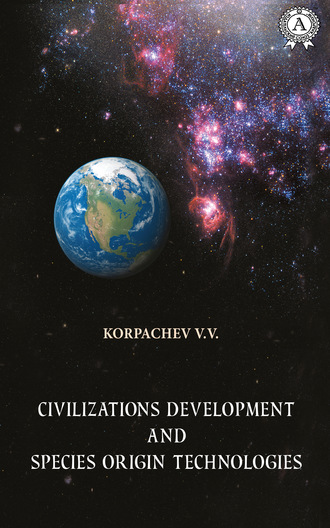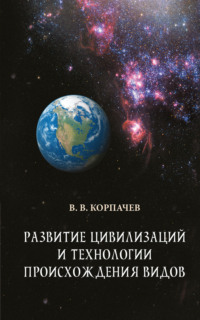
Полная версия
Civilizations development and species origin technologies
Georges Cuvier, who rejected Lamarck’s theory of evolution, was convinced that «the Creator of all creatures, while creating them, could have been guided by only one law − the necessity to give each of his creations, which should continue life, means to sustain existence». Jean-Henri Fabre, the French entomologist, echoed him: «The world is ruled by an Infinite Intelligence. The more I observe, the more I discover this Intelligence, shining behind the mystery of the existing world. I know that they will laugh at me, but I care little about it; it’s easier to strip my skin off than deprive me of my faith in God». The Russian academician P. S. Pallas argued: «… A species is a constant unit, and species should be considered to be designed in the first plan of creation and assigned to form the chain of creatures that we admire not being able to explain this chain».
John Stuart Mill in his posthumously published essays «On Religion» (Th ee Essays on Religion, 1874) noted that the world order indicates the existence of an ordering intelligence. However, this does not give us any reasons to believe that God has created matter, that he is omnipotent and omniscient. God is not the Absolute Everything; a man collaborates with God in restoring the order, harmony and justice. A number of scientists in their judgments avoided the word God and used the word Creator instead. So, Louis Pasteur, the founder of modern microbiology and immunology, stated: «the more I study nature, the more I stop in awed amazement at the Creator’s affairs».
Georg Hegel believed that there is the Absolute Spirit which is the basis of everything that exists, which, because of its infinity only, can achieve true selfknowledge. It needs a manifestation for selfknowledge. Self-disclosure of the Absolute Spirit in space is nature; and self-disclosure in time − history. The mission of world-historical personalities was to be agents of a universal spirit.
William Whewell argued that «…it is impossible to practice biology without the objective purposes in nature’s assumption and ultimate cause». In his view, the common feature of «palaiologina Sciences» (historical casualty sciences) is the inability to explain the origins of the modern state of things through a natural way from some «initial state» without the assumption of supernatural intervention». Being a principled evolutionism opponent, he believed that «a creative power manifested» itself at the beginning of each new geological period. He did not admit trasnformism in biology, saying that «admission of the new species’ as a natural phenomenon in nature, without pointing at the same time on the real facts confirming such an assumption, therefore, stands for the completely unfounded rejection of the creation hypothesis». This statement is not an object of faith, but a scientific axiom. Its essence is reduced to the cosmological argument («History and science», 1894, Russian translation, 1900).
Johann Goethe, the German poet, thinker and natural scientist, the founder of the plants metamorphosis’s doctrine, drifting towards the idea of evolution, believed that it can only occur within certain limits under the guidance of the Creator. He wrote: «All parts are formed according to the eternal laws, and the rarest form is secretly similar to the original image».
Voltaire said: «One needs to be blind, so as not to be blinded by this picture, one needs to be a fool to reject its Creator, one needs to be crazy not to bow before Him».
K. E. Tsiolkovsky noted in his scientific paper «Unknown Intelligent Powers»: «The will of man and all other beings – both higher and lower ones − is only a manifestation of the Universe’s will. The voice of a man, his thoughts, discoveries, concepts, truths and delusions − is only the voice of the Universe».
Pierre-Simon de Laplace addressed Napoleon Bonaparte with the following statement: «My religion is simple: I look at the Universe and I am convinced that it could not be a matter of blind chance, but was created by some unknown and almighty being that is as much exceeds a man as far the Universe exceeds our best machines». His answer to Napoleon’s question whether God was offered a place in the world’s system proposed by Laplace was as follows: «I did not need such a hypothesis».
Justus Liebig, the German chemist, exclaimed: «Do not forget that with all our knowledge and researches we remain short-sighted people whose strength is rooted in the fact that we have support in the person of the higher Creature».
Jöns Jakob Berzelius, the Swedish chemist, wrote: «All organic nature gives evidences of the wise goal’s existence and is a product of a higher intelligence… Thus, a person’s mission is to consider his higher ability − the ability to think» in accordance with the Creature to which he owes his existence».
A whole series of statements dedicated to the Supreme Intelligence belongs to famous physicists. Isaac Newton, one of the greatest geniuses of mankind, who introduced his own version of biblical chronology, left after himself a significant number of manuscripts on these issues. In his Principia Philosophiae, he wrote: «The Heavenly Sovereign rules the whole world as the ruler of the Universe. We marvel at Him because of His perfection, worship Him and bow to Him because of His infinite power. From a blind physical necessity, which is always and everywhere the same, no variety could have occurred, and all the variety of created objects corresponding the place and time, which constitutes the structure and life of the Universe, could have happened only by the thought and will of the Original Creature, which I call the Lord, God». «The wonderful arrangement of the space and harmony in it can only be explained by the fact that the space was created according to the plan of the omniscient and omnipotent Creature. This is my first and last word». Isaac Newton also noted: «How do bodies movements obey the will and where does animal instinct come from?… And if He did so, then philosophy should not look for other origin of the world or believe that the world could have occurred out of chaos only in accordance with the laws of nature…». The economist John Maynard Keynes, who purchased Newton’s alchemy notes, said at the jubilee of Newton’s three hundredth birthday: «He considered the Universe to be a cryptogram composed by the Almighty God».
Albert Einstein in his letter to the New York rabbi Goldstein in 1924 wrote such words: «I believe in Spinoza’s God, who manifests himself in the natural harmony of life, but not in God, who cares about fate and people’s affairs». In another letter, one can read such words: «I do not believe in a personal God. I expressed my attitude towards God clearly and have never refused my words. If one may consider some my statements to be religious, then it is probably due to my unlimited admiration for the world’s structure that science shows us.» He expressed the following thought:
«The one, who is seriously engaged in science, is convinced that there is a certain spirit in the laws of nature, and this spirit is higher than man».
The same idea was expressed by James Joule, the English physicist:
«There is a vast variety of phenomena we face which are the evidences of the Great Universe Architect’s wisdom and kindness» Max Planck, the outstanding physicist and founder of quantum physics, once said the following: «Both religion and natural science need faith in God, at the same time, God stands at the beginning of all thinking for religion, and at the end − for natural science. For some people, He means the foundation, and for others − the peak of any worldview principles’ building».
Andrе-Marie Ampеre, another famous French physicist, said:
«The most convincing evidence of the God’s existence is the harmony of means by which order is maintained in the universe, due to this order, living things find everything they need for the development and reproduction of their physical and spiritual abilities in their organisms».
Werner Heisenberg, the German physicist and one of the quantum mechanics’ founders, expressed the similar idea: «The first sip from the natural science’s cup gives rise to atheism, but God waits for us at the bottom of the vessel».
Andrei Sakharov, a Soviet physicist and one of the hydrogen bomb’s developers, said: «My deepest feeling… is the existence of some kind of the nature’s inner meaning… And this feeling, perhaps predominantly feeds on the picture that has been opened before people in the XX century. «I don’t know at heart what my position really is, I believe in no dogma, I don’t like official churches. At the same time, I can’t imagine the Universe and human life without any meaningful beginning, without a source of spiritual «warmth» going far beyond the matter and its laws».
James Jeans, the English astrophysicist, said in a similar way:
«Primitive cosmogonies presented the Creator working in time, forging the Sun and the Moon and stars from the already existing raw material. Modern scientific theory makes us think of the Creator working out of time and spaces, which are part of His creation, as well as the artist is out of his canvas».
Pascual Jordan, a German physicist, one of quantum mechanics’ founders, also noted that «Modern science has removed the obstacles that previously were between natural knowledge and religious worldview. Contemporary natural science no longer rebels against the Creator».
Thomas Edison, a well-known physicist-inventor answered the question of expediency in the world of atoms during an interview in the following: «Do you really think that it is done without any sense? The harmonious and useful combinations of atoms take beautiful and interesting shapes and colours, as if expressing their pleasure. In illness, death, decay, or decay, the disagreement of the compound atoms immediately manifests itself through the fetid odour. The atoms united in the known forms constitute the lower ranks’ animals. Finally, they are united in a man, who represents the complete harmony of meaningful atoms».
The same opinion was shared by William Herschel, the English astronomer: «The more the field of science is broadening, the more evidences of an Eternal Creative and Almighty Intelligence existence appear».
John Fleming, the English physicist and radio engineer, wrote on this occasion: «A great number of modern discoveries have completely destroyed the old materialistic ideas. Nowadays, the Universe appears before us today as a thought, but thought presupposes the presence of a Thinker».
Stephen Hawking, a modern theoretical physicist, wrote: «My studies of the Universe are in the boundary zone between science and religion, but I do my best to stay on the scientific side. It is quite possible that God acts in such a way that is not described by scientific laws, but in such a case, the person has to rely on its own faith. Even if there is only a single unified theory – it is just a set of rules and equations. What adds fire to the equations and creates the Universe to be described? The common scientific approach of a mathematical model constructing does not provide the answer to the question of why the universe should exist to be described by this model. Why does the Universe exist at all? (Stephen Hawking, A Brief History of Time: From the Big Bang to Black Holes, New York, 1988, 174).
I would like to finish this list of the famous scientists’ sayings with the final phrase of the «Origin of Species», the main paper by Charles Darwin. It reads as follows: «There is greatness in this view, according to which the Creator initially breathed life with its various manifestations into one or a limited number of forms; and while our planet is spinning, according to the unchanging laws of gravity, an infinite number of the most beautiful and most amazing forms has occurred and continues to occur from such a simple principle». He also noted in this book: «The world rests on regularities and in its manifestations is presented as a product of the Intelligence − this is an indication of its Creator».
The fact of the availability of a great number of the greatest scientists and thinkers of the human history’s different periods who speculated about the role of the Supreme Intelligence is an obvious incentive to analyze the most important issues of the life’s creation and functioning on Earth, the rationality and its planned creation not on the basis of the spontaneous development principle and, of course, not on the basis of religious beliefs.
1.8. NECESSITY OF NEW POINTS ON THE LIFE DEVELOPMENT ON EARTH
The evolutionary theory gave a huge impetus to the development of science, made it possible to accumulate huge factual material about the various species on Earth occurrence’s sequence within the process of their improvement. Therefore, all scientifi dogmas are viewed only from the standpoint of the evolutionary theory, despite its contradictory arguments and improvability. Being the only scientifi explanation of the origin of life, it argues that after millions of years since Earth had been formed, life occurred on it due to the pure chance, the development of which was performed in a natural way − from unicellular organisms to millions of various plants and animals that currently exist.
L. S. Berg (Берг Лев Семенович) expressed the need for evolutionary views’ reconsideration long time ago expressed in such scientific papers as «Nomogenesis or Evolution based on Regularities», «Works on the Theory of Evolution» and «Theory of Evolution». He compiled the vast factual material accumulated by the early twentieth century which testified the organisms’ natural variability within the evolutionary process and the organisms’ inherent initial practicability. In his opinion, as the result of the embryonic potentially available signs’ development and improvement the new, more complex forms are formed with time. The conclusion of the performative nature of evolution was the logical one. He provided the detailed and substantiated arguments in favour of the fact that, although it contradicts Daewin’s concept, evolution is not an accidental process but the naturally determined one in which chaotic mutations and natural selection have their own focus. In his opinion, the essence can be illustrated by a simple analogy: although the development of the individual organism is influenced by many random factors, there are no doubts that the inner information that is contained in the genes is the main and determining factor. The entire history of the body is the implementation of the program, which determines what will grow, for example, from the given seed, a birch or a pine. The whole biosphere’s evolution, according to Berg, is the «unfolding of a Law or multidimensional program, which contains numerous methods for its implementation. Therefore, Berg called his concept the nomogenesis (from the Greek. nomos – «law»), contrasting it to the Darwinian concept of tychogenesis, i.e. development that is based on chance. Berg did not discuss the question of the source of this law. In his opinion, a number of General biological phenomena suggest that the process of evolution cannot be described even in the qualitative aspect within the framework of Darwin’s diagram.
The principles of nomogenesis were briefly summarized in form of the table and contrasted with the Darwinism’s postulates as follows. If in Darwinism all organisms developed from one or few primary forms, in nomogenesis organisms developed from many thousands of primary forms; if in Darwinism the further development proceeded divergently, in nomogenesis it was predominantly convergent (partially divergent); while evolution in Darwinism is based on random variations that separate individuals undergo by means of slow, hardly noticeable continuous changes, in nomogenesis it is based on leaps and paroxysms, mutationally capturing the vast masses of individuals on a vast territory; if in Darwinism there are many hereditary variations and they go in all directions, in nomogenesis hereditary variations are limited in number and they go in certain directions; if in Darwinism the struggle for existence and natural selection serves the factor of progress, in nomogenesis the struggle for existence and natural selection are not factors of progress, but preserve the norm; if in Darwinism, species are connected with each other by transitions due to their origin by divergence, in nomogenesis species are sharply separated from each other due to their mutational origin; if in Darwinism the evolutionary process means entirely the new traits’ formation, in nomogenesis evolution is to a large extent the deployment of existing inclinations; if in Darwinism, the extinction of organisms occurs due to the external causes (the struggle for the existence and survival of the fittest), in nomogenesis, extinction is a consequence of both internal (autonomous) causes and external (choronomic).
A. Lima-de-Faria, a famous biologist, also wrote in the book «Evolution without Selection: Form and Function by Autoevolution» (1991) that biological evolution is determined by the three forms preceding it: elementary particles, chemical elements and minerals. In all these processes, natural selection, or something similar to it, if any, was then a secondary factor. According to him, «… each new level occurs as a typical innovation not because it creates something fundamentally new, but because it is a continuation of only few already limited combinations of previous levels».
The evolutionary approach dominates in modern science, and anyone who doubts its reliability risks being marked as an ignoramus. However, by the beginning of the third millennium, enough scientific facts contradicting the «random processes» theories in the development of life on Earth have been accumulated. It is becoming increasingly apparent that a complex and finely balanced set of physicochemical processes in protein organisms cannot be explained by chance. The increase of the biological complexity knowledge has created a kind of dead end in the modern theory of the origin of life. The search for truth is complicated by the fact that the creationism is the only alternative to Darwinism in the society’s opinion, which insists on a literal understanding of the picture of the world’s origin described in the Biblical text. Therefore, the educational level of a modern man contradicts the mythical views on the creation of the world and he has no other choice but to follow the dogmatic principles of the evolutionary theory, which would not have been so widespread if it had not refuted the ideas of the divine creation of life on Earth. It exists only because there is no sufficiently developed alternative.
Darwinism is the only branch of modern biology, where hypotheses are accepted by the scientifi community as suffi t ones. It is impossible to provide direct evidences to confi m the facts which took place long time ago. Therefore, the existing ideas about the origin of life on Earth are the hypothetical assumptions based on the facts of past events, which can be interpreted in different ways. The task of scientists is to choose the most logical ones corresponding the fundamental biological and philosophical laws of the development of matter. The theory of evolution is one of the options to explain the origin of species on Earth, but it is impossible to deny the possibility of other theories development that can be more convincing and more justifi d, and also able to explain many obscure phenomena observed on the planet.
It is diffi ult to disagree with the words by Fred Hoyle: «Instead of agreeing with the infi tely small probability of the occurrence of life under the influence of the nature blind forces, it is probably better to assume that life occurred as a result of a deliberate, meaningful action».
Chapter 2
CIVILIZATIONS’ DEVELOPMENT LAWS
2.1. SYNERGETICS AND «THINKING SUBSTANCE» DEVELOPMENT
The order of protein life and its increasing complexity contradict the Second Law of Thermodynamics, which states that disorder (entropy) can only increase in a closed system. This is especially evident in the developing organisms, when the amount of information increases dramatically during morphogenesis. The evolutionary theory’s opponents believe that evolution and the Second Law of Thermodynamics cannot be correct at the same time, and the occurrence of the living (ordered) from the inanimate (disordered) is impossible in general.
However, according to the evolutionary theory’s supporters, developing systems are always open and exchange energy and substance with the environment, due to which the local ordering and self-organization processes take place. The Austrian physicist Erwin Schrödinger introduced the negative entropy concept, which living beings should receive from the environment in order to compensate the entropy’s growth, leading them to the thermodynamic equilibrium and, consequently, to death. He stated that an organism can «stay alive only by means of constant negative entropy’s extraction from the environment, which is itself something very positive… Negative entropy is what feeds the organism. Or, in order to express it in a less paradoxical way, what is essential in metabolism is the fact that the body manages to free itself from all that entropy that it has to produce while it is alive».
Later, Leon Nicolas Brillouin, the American physicist, introduced the term negentropy in his paper «Scientific Uncertainty and Information» (1964): «information itself is a negative contribution to entropy». Negentropy is opposed to entropy and expresses the material objects ordering.
E. Schrödinger in one of the last chapters of his book «What is Life? Physical Aspects of the Living Cell» pointed out the existence of two different mechanisms for the ordering phenomena: the statistical one that creates «order from disorder» and the new mechanism introduced by him, which creates «order from order». He stated: «We have the right to assume that the living matter obeys a new type of the physical law. Or should we call it nonphysical one, if not to say the super physical law?» At the same time, E. Schrödinger does not explain how order occurs in living systems. He states that if the «order from order» mechanism operates in the living substance, and the order is drawn from the environmental order, then the inanimate substance owes the order occurrence to the «order from disorder» principle.
However, the question arises: what is the origin of order in the environment? The fact of an open system and available external energy existence does not generate the order in the given system. Where does the specifi information that does not only deter entropy, but contributes to the strictly determined specifi order and complexity in the course of historical development come from, if, according to the increasing entropy law, simplifi ation and degradation should take place? Not just abstract information should prevent it, and specifi complex one, which may not occur spontaneously. Protein life is not degrading, but is getting more refi ed and complicated, which is impossible without the new specifi information that someone should create. It is logical to assume that the entropy overcoming in living organisms is performed by using information created by the intelligence.
Such an interdisciplinary scientific trend as synergetic, which studies natural phenomena and processes on the basis of the self-organization principles of systems consisting of subsystems, and new qualities self-generation, can provide a certain idea of the material intelligence’s occurrence. This process, despite its spontaneity, has a certain focus: there is an increase in various elementary and primitive forms and structures to complex and more advanced ones.
The following main empirical generalizations are at the basis of synergetic:
1. The Universe is a single self-developing system.
2. In the course of the Universe’s development, random factors are present, processes occur in terms of a definite uncertainty level. They are characteristic for all the levels of the world’s organization.
3. There is heredity in the Universe, the present and future depend on the past, but are not determined by it.
4. The world is dominated by laws, which are the selection principles. They distinguish a certain set of admissible states from possible virtual ones.
5. Selection allows the existence of bifurcation states in which it is impossible to predict the way of further development since the new channel is largely determined by factors out-of-control at the bifurcation point.





